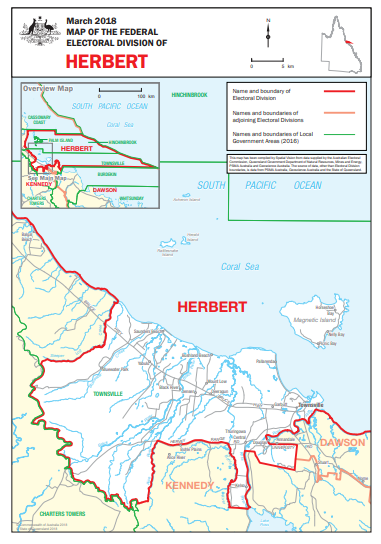|
|
|
|
| Adam Carr's Election Archive
|
Australian federal election, 2022
Division of Herbert, Queensland
Named for: Hon Sir Robert Herbert (1831-1905), Qld MP 1860-66, first
Premier of Qld 1859-66
North Queensland: Condon, Kirwan, Mount Louisa, Mundingburra, Townsville
State seats: All of
Townsville, parts of
Burdekin,
Hinchinbrook,
Mundingburra and
Thuringowa
Local government areas: All of
Palm Island, parts of
Townsville
Borders with:
Dawson,
Kennedy
Enrolment at 2019 election: 108,434
Enrolment at 2022 election: 114,257 (+05.4)
1999 republic referendum: No 61.5
2018 same-sex marriage survey: Yes 62.8
Sitting member: Phillip Thompson OAM (Liberal):
Elected 2019
2007 Liberal majority over Labor: 0.2%
2010 Liberal majority over Labor: 2.2%
2013 Liberal majority over Labor: 6.3%
2016 Labor majority over Liberal: 0.0%
2019 Liberal majority over Labor: 8.4%
Liberal two-party vote 1983-2019
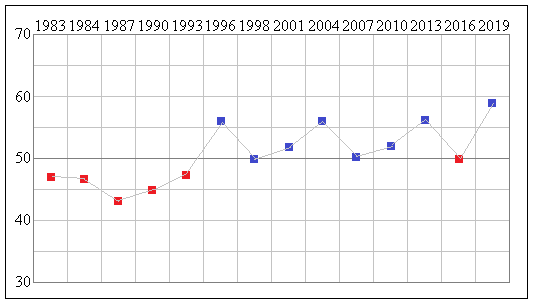
Status: Fairly safe Liberal
Best Liberal booths, two-party vote: Alice River (68.2) TFT Range Control PPVC (68.1),
Deeragun (64.9), Hyde Park PPVC (64.4), Kirwan East (62.6)
Best Labor booths, two-party vote: Palm Island (69.0), Nelly Bay (53.8), Douglas (53.1), Cutheringa (51.1),
Currajong (50.9)
2019 results
Statistics and history
Candidates in ballot-paper order:
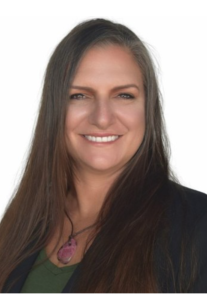 |
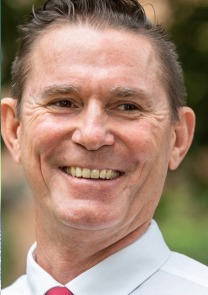 |
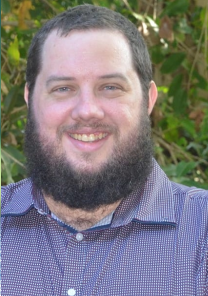 |
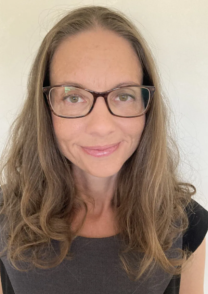 |
1. Toni McMahon
Informed Medical Opinion |
2. John Ring
Australian Labor Party |
3. Scott Humphreys
Australian Greens |
4. Larna Ballard
Great Australian Party |
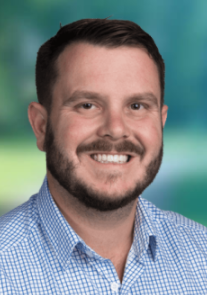 |
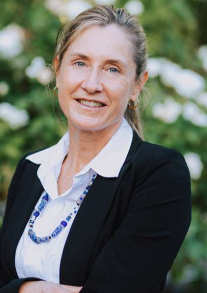 |
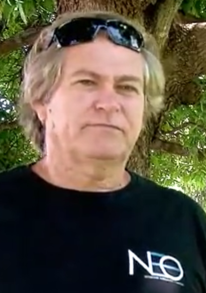 |
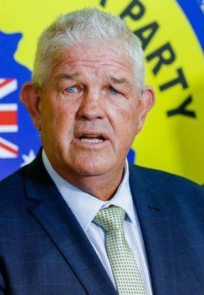 |
5. Phillip Thompson
Liberal Party |
6. Dr Angela Egan
Independent |
7. Steven Clare
Independent |
8. Greg Dowling
United Australia Party |
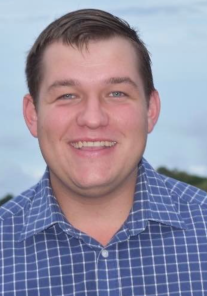 |
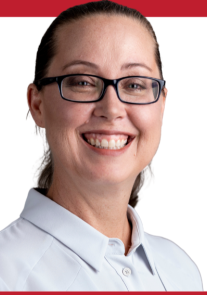 |
 |
9. Clynton Hawks
Katter's Australian Party |
10. Toni McCormack
Animal Justice Party |
11. Diane Pepe
Pauline Hanson's One Nation |
Candidate websites:
Larna Ballard
Greg Dowling
Dr Angela Egan
Clynton Hawks
Scott Humphreys
Toni McCormack
Toni McMahon
John Ring
Phillip Thompson
Division of Herbert
Herbert has existed since Federation, and once covered all of north Queensland. Since 1949 it has consisted of Townsville
and surrounding areas. The 2006 redistribution cut it back to the city and suburbs, making it an entirely urban seat for
the first time. It was unchanged by the 2018 redistribution. Townsville is a regional administrative centre and a booming
tourist town, so Herbert has a somewhat higher level of median family income than most regional seats, and also a high
proportion of government employees, including many defence personnel.
For most of its early history Herbert was a safe Labor seat, although its first Labor member retained it as a Nationalist
for most of the 1920s. In recent times, as Labor's regional base has declined, Herbert has trended Liberal, a process hastened
by the large military vote. Labor retains strength in the older parts of the city, and also among the Indigenous voters of
Palm Island, but Townsville's new outer suburbs tend to be more conservative. Labor lost the seat in 1966, and did not regain
it until 1983, when
Ted Lindsay won it in the Hawke landslide and held it until 1996.
Peter Lindsay (no relation) won the
seat for the Liberals in 1996, and retained it without too much difficulty until his retirement in 2010, when
Ewen Jones
retained it with a swing in his favour. He increased his majority in 2013.
In 2016, however, there was a sharp and unexpected swing to Labor, and after an epic count Herbert fell by 37 votes to
Labor's
Cathy O'Toole, who had also contested the seat in 2013. As Labor's most marginal seat, Herbert was hotly contested in
2019, and its loss in the anti-Labor sweep of regional Queensland was so surprise.
Phillip Thompson OAM, Liberal MP for Herbert since 2019, is a veteran of the Afghanistan war and was 2018 Young Queenslander
of the Year. Having gained an 8% swing in 2019 he now probably fairly secure, although Labor won all the Townsville seats at the
2020 state election. The Labor candidate is John Ring, an aviation firefighter and RAAF veteran. The Greens candidate is
Scott Humphreys, a security guard.
Demographics:
Median weekly household income: $1,392 (Australia $1,438)
People over 65: 11.7% (Australia 15.8%)
Indigenous: 8.5% (Australia 2.8%)
Non-English-speaking households: 9.1% (Australia 22.2%)
Catholics 26.9% (Australia 22.6%)
No religion 28.6% (Australia 29.6%)
University graduates: 15.3% (Australia 22.0%)
Professional and managerial employment: 27.8% (Australia 35.2%)
Employed in manufacturing and construction: 20.6% (Australia 22.9%)
Paying a mortgage: 34.1% (Australia 34.5%)
Renting: 41.0% (Australia 30.9%)
Traditional families: 29.5% (Australia 32.8%)
Back to main page
|
|

